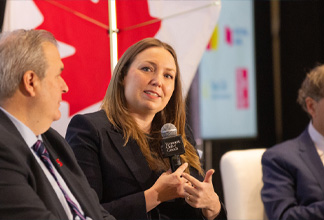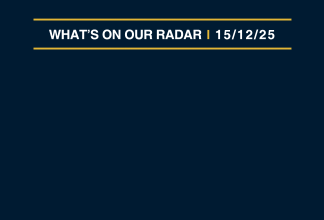Bank of Canada Raises Key Interest Rate to 4.75%
Written by The Inspired Investor Team
Published on June 8, 2023
minute read
Share:
The Bank of Canada raised its key interest rate on Wednesday to 4.75 per cent, saying underlying inflation continues to sit at "stubbornly high" levels.
The quarter-point bump is the first increase since January, when Canada's central bank signalled it would pause to assess the moves it had already taken to tame inflation. The Bank of Canada has now raised its benchmark lending rate nine times since the beginning of 2022.
“Today's increase is hardly shocking given recent data flow, but was only expected by a handful of analysts," said RBC Senior Economist Josh Nye in a report. Nye pointed to data such as stronger-than-expected first-quarter GDP growth, a surprising uptick in inflation in April, ongoing low unemployment and a Canadian housing correction that "appears to have run its course."
"Overall, excess demand in the economy looks to be more persistent than anticipated," the central bank said in its rate-decision statement. It added that the rate hike reflects “our view that monetary policy was not sufficiently restrictive to bring supply and demand back into balance and return inflation sustainably to the two per cent target."
The Bank of Canada aims to keep inflation at the two per cent midpoint of a target range of one to three per cent. Headline inflation in Canada accelerated slightly in April to 4.4 per cent from 4.3 per cent in March. The central bank said Wednesday that, with three-month measures of core inflation running in the 3.5 to four per cent range for a number of months and excess demand persisting, it has increased concerns that inflation “could get stuck materially above the two per cent target."
The Bank of Canada also said quantitative tightening "is complementing the restrictive stance of monetary policy and normalizing the Bank's balance sheet." The Bank of Canada announced a year ago that it would begin quantitative tightening, or QT, meaning it would stop purchasing Government of Canada bonds in order to let its balance sheet shrink over time. QT is the opposite of quantitative easing, or QE, a tool the bank turned to during the pandemic to help encourage spending and investment.
The next rate decision is scheduled on July 12. “It's an unusually short five weeks until the July rate decision, but that period is packed with key releases," said Nye, including two employment reports, another inflation reading, gross domestic product data and the second quarter Business Outlook Survey.
“The onus is clearly on that data to soften broadly to preclude another rate hike," Nye said.
For more on interest rates, inflation and central banks, check out:
What Rising Interest Rates Can Mean for Investors
What is Inflation and How Does it Affect Investors?
A Bank With A Mission: How Central Banks Shape the Economy and Your Money
RBC Direct Investing Inc. and Royal Bank of Canada are separate corporate entities which are affiliated. RBC Direct Investing Inc. is a wholly owned subsidiary of Royal Bank of Canada and is a Member of the Investment Industry Regulatory Organization of Canada and the Canadian Investor Protection Fund. Royal Bank of Canada and certain of its issuers are related to RBC Direct Investing Inc. RBC Direct Investing Inc. does not provide investment advice or recommendations regarding the purchase or sale of any securities. Investors are responsible for their own investment decisions. RBC Direct Investing is a business name used by RBC Direct Investing Inc. ® / ™ Trademark(s) of Royal Bank of Canada. RBC and Royal Bank are registered trademarks of Royal Bank of Canada. Used under licence.
© Royal Bank of Canada 2023.
Any information, opinions or views provided in this document, including hyperlinks to the RBC Direct Investing Inc. website or the websites of its affiliates or third parties, are for your general information only, and are not intended to provide legal, investment, financial, accounting, tax or other professional advice. While information presented is believed to be factual and current, its accuracy is not guaranteed and it should not be regarded as a complete analysis of the subjects discussed. All expressions of opinion reflect the judgment of the author(s) as of the date of publication and are subject to change. No endorsement of any third parties or their advice, opinions, information, products or services is expressly given or implied by RBC Direct Investing Inc. or its affiliates. You should consult with your advisor before taking any action based upon the information contained in this document.
Furthermore, the products, services and securities referred to in this publication are only available in Canada and other jurisdictions where they may be legally offered for sale. If you are not currently a resident of Canada, you should not access the information available on the RBC Direct Investing Inc. website.
Explore More

7 Ways to Get Ahead Financially in 2026
How you might invigorate your finances and put your money to work more intentionally this year
minute read

Economic Outlook: Uncertainty is Here to Stay, So What's Next?
Takeaways from the Economic Club of Canada’s Annual Event
minute read

3 things: Week of December 15
What the Inspired Investor team is watching this week
minute read
Inspired Investor brings you personal stories, timely information and expert insights to empower your investment decisions. Visit About Us to find out more.







